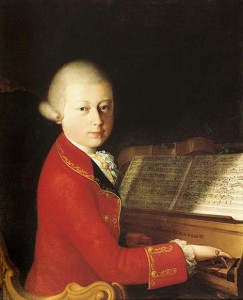Mira’s box-set fascination continues with the complete Mozart Piano Concertos (period instrument recordings with Malcom Bilson and John Eliot Gardiner). While Mozart’s symphonies are great pieces and are rightfully seen as a pillar in his oeuvre, along with his operas I see Mozart’s Piano Concertos as his most important works. Mostly because they are the most operatic of his purely instrumental works. The standards he helped set up and solidify for the classical concerto are on the same level as Haydn’s contribution to the sonata-allegro form. And the dramatic contrast of the soloist and the orchestra is developed to a very deep level. Since there is no text and they are more abstract then the operas, that these works have such strong dramatic form is even more impressive to me. And that the piano writing basically defines lyrical (for an instrument where the attack is so univocal) is even more impressive to me.
The first one I heard was on one of Tamiko’s Music History tapes (while I was still in high school and hadn’t heard much classical music yet). Number 20 in d minor is a pretty dark piece. Between that, what I had heard of the Requiem and snippets of the ‘Amadeus’ soundtrack, I though Mozart was one dark guy. Dark and intense! And while he does have those moments, that certainly isn’t the case for 95% of his music. So when he does write some dark music, it almost seems like he is saving it up. Mozart’s light is often quite pleasant, but when he gets dark he knew what he was doing.
I got the Bilson / Gardiner set after I knew Mozart’s work much better. I put on the disc with number 20 first and I was shocked at how different it sounded on the older instruments. The piano’s sound is thinner, and the thundering low octaves in parts of the first movement take on a different lyrical quality on the older instrument (where the octaves just help the line come out of the texture in a more balanced fashion. It was amazing to hear how much the same instruments (but in a much younger form) changed how a piece sounded. The music is intense in a different way. But with the older instruments the intensity actually works on a much more human level. Where on modern instruments it feels like the doom of the world, the older instruments make it feel like the doom of a man. The period instruments make the whole body of work more personal, and in some ways even more tragic. But it is also what makes the second movement even more beautiful. It is the voice of someone who has come through a storm. And it is strange to me that, at this more personal level, the works in general feel more universal.


